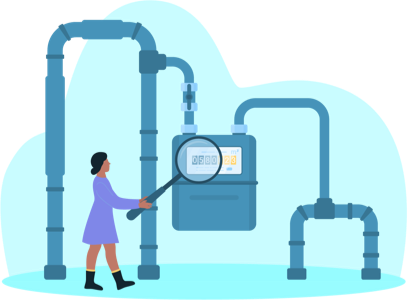Energy: electricity or gas shortages
Electricity: risk of shortage
Since it is technically impossible to store large quantities of electricity, it has to be generated at the same time it is consumed. For the electricity network to function properly, therefore, the production and consumption of electricity must be constantly balanced. The government, economic operators and network operators have taken structural and preventive measures to guarantee the security of our country's electricity supply. Under normal circumstances, the risk of an electricity shortage is therefore very low. However, in exceptional circumstances, and particularly in the event of cold snaps affecting the whole of Europe for several days, difficulties could arise on the Belgian and international electricity markets. In addition to price increases and a greater need for electricity from abroad, these extreme winter conditions could lead to a risk of electricity shortages on certain days.
Online electricity supply indicator
As manager of Belgium's high-voltage infrastructure and electricity system, Elia publishes a level of shortage risk via an electricity indicator. Thanks to this online tool, you can monitor our country's electricity supply situation for the next seven days at any time. It is updated daily and uses different colour codes depending on the risk of shortage.
View Elia's electricity indicator here
In the event of an identified risk of electricity shortages, the first measure planned is to reduce the country's consumption. Indeed, a shortage can be avoided if we all make an effort to reduce our consumption, especially at critical peak consumption times (between 5 and 8pm, when many people return home and consume electricity for heating, lighting or cooking, while commercial and industrial activities are still in operation).
Selective power cuts and blackouts
If voluntary reduction of consumption is not enough, a "selective power cut" may be implemented in certain areas of the country. In practical terms, this involves manually disconnecting certain municipalities or sub-municipalities, spread across the whole of Belgium, to prevent the total collapse of the electricity networks, the famous "blackout". A blackout is when the electricity network collapses completely due to an imbalance, i.e. when demand for electricity exceeds supply. Such a widespread, uncontrolled outage can last several hours, and have a major impact on the country's socio-economic life.
To avoid a blackout, the Belgian authorities have drawn up a set of emergency measures in collaboration with Elia, distribution network operators such as Sibelga and the National Crisis Center (NCCN). As a last resort, one of these measures is the selective power cuts plan. By voluntarily cutting off electricity in certain areas in a controlled way, for a short period (usually 2 to 3 hours), the aim is to enable power plants to rebalance the electricity network.
No selective power cuts in Brussels
Firstly, less densely populated rural areas will have their power cut off. There will be no manual selective power cut in Brussels, with the exception of two small areas in Uccle and Laeken. Consult the street map on the Sibelga website to find out which streets are affected.
However, all inhabitants of the Brussels Region are invited to participate in national efforts to reduce electricity consumption. By showing solidarity, you can help to avoid voluntary selective power cuts affecting other parts of the country.
Natural gas: risk of shortage
Natural gas accounts for around 25% of final energy consumption in Belgium, and almost 45% in Brussels, demonstrating its importance to our country. With Russia's invasion of Ukraine on 24 February 2022, Europe has reviewed its natural gas supply policy. In addition to rising prices, Europe is now strategically aiming to reduce Russian energy imports as quickly as possible, in order to move towards greater energy independence. Before the outbreak of war in Ukraine, Russian gas deliveries accounted for just 6% of Belgian consumption.
Belgium is at the heart of the European gas landscape, with diversified supply sources and strategic storage available, making the risk of natural gas shortages in our country relatively low. In addition, a solidarity mechanism has been set up in the European Union, obliging the 27 European countries to pool some of their gas in the event of a shortage.
At national level, the FPS Economy updated the "gas emergency plan" in September 2022, in collaboration with CREG, the National Crisis Center (NCCN) and the transmission network operator Fluxys. In the event of an increased risk of a gas shortage, the Federal Minister of Energy may, in collaboration with Fluxys, activate the emergency plan and take emergency measures to avoid any interruption to supply in the country. The first measure will be to ask everyone to voluntarily reduce their gas (and electricity) consumption. Subsequently, if the shortage persists, there will be a request, targeting certain socio-economic sectors in particular, to reduce or even suspend their consumption. The aim is to avoid physically disconnecting certain areas of the country, i.e. "manually closing the valves", which would cause major difficulties when recommissioning the pipelines concerned. Considered priority customers, households will also be asked to reduce their gas consumption in order to minimise the impact of the shortage on the Belgium's socio-economic life as a whole.
Energy in Brussels
Sibelga, the electricity and natural gas distribution network operator for the 19 municipalities of the Brussels-Capital Region has developed an Energuide on its website. You can find the answers to all your questions about energy in Brussels here. On the SocialEnergie website, you'll find information on energy prices and support measures in the Brussels-Capital Region in the context of the energy crisis.

Useful links
Find out more about what to do in the event of an electricity or gas shortage.




